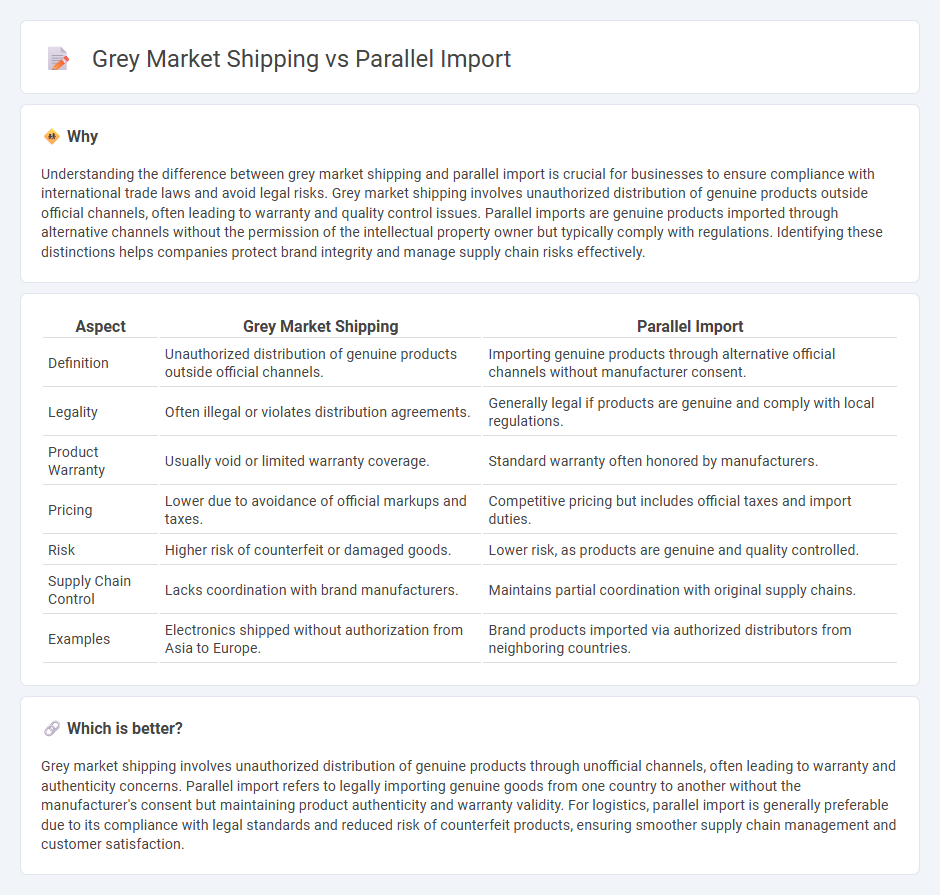
Grey market shipping involves the unauthorized distribution of genuine products outside official channels, often bypassing manufacturer restrictions and warranties. Parallel import refers to the legal importation of genuine goods from other markets without the permission of the intellectual property owner, typically to offer lower prices. Explore the key differences and implications of these practices to understand their impact on global logistics.
Why it is important
Understanding the difference between grey market shipping and parallel import is crucial for businesses to ensure compliance with international trade laws and avoid legal risks. Grey market shipping involves unauthorized distribution of genuine products outside official channels, often leading to warranty and quality control issues. Parallel imports are genuine products imported through alternative channels without the permission of the intellectual property owner but typically comply with regulations. Identifying these distinctions helps companies protect brand integrity and manage supply chain risks effectively.
Comparison Table
| Aspect | Grey Market Shipping | Parallel Import |
|---|---|---|
| Definition | Unauthorized distribution of genuine products outside official channels. | Importing genuine products through alternative official channels without manufacturer consent. |
| Legality | Often illegal or violates distribution agreements. | Generally legal if products are genuine and comply with local regulations. |
| Product Warranty | Usually void or limited warranty coverage. | Standard warranty often honored by manufacturers. |
| Pricing | Lower due to avoidance of official markups and taxes. | Competitive pricing but includes official taxes and import duties. |
| Risk | Higher risk of counterfeit or damaged goods. | Lower risk, as products are genuine and quality controlled. |
| Supply Chain Control | Lacks coordination with brand manufacturers. | Maintains partial coordination with original supply chains. |
| Examples | Electronics shipped without authorization from Asia to Europe. | Brand products imported via authorized distributors from neighboring countries. |
Which is better?
Grey market shipping involves unauthorized distribution of genuine products through unofficial channels, often leading to warranty and authenticity concerns. Parallel import refers to legally importing genuine goods from one country to another without the manufacturer's consent but maintaining product authenticity and warranty validity. For logistics, parallel import is generally preferable due to its compliance with legal standards and reduced risk of counterfeit products, ensuring smoother supply chain management and customer satisfaction.
Connection
Grey market shipping involves the unauthorized distribution of genuine products through unofficial channels, often bypassing authorized logistics networks. Parallel imports occur when goods are imported and sold through these grey market channels without the consent of the intellectual property owner, impacting supply chain integrity. This connection challenges traditional logistics by disrupting inventory control, customs compliance, and authorized distribution agreements.
Key Terms
Intellectual Property Rights
Parallel import involves importing genuine products purchased abroad and reselling them without the intellectual property rights holder's authorization, often challenging trademark and distribution rights. Grey market shipping refers to the unauthorized distribution channel where genuine goods are traded through unofficial, unauthorized routes, potentially infringing on IP rights by bypassing authorized sellers. Explore further to understand the legal nuances and impact on intellectual property enforcement in both parallel import and grey market shipping.
Distribution Channels
Parallel import involves the legitimate purchase of goods in one country and their resale in another without the manufacturer's authorization, utilizing official distribution channels to some extent. Grey market shipping bypasses authorized distributors entirely, often leveraging unauthorized or unofficial distribution networks to introduce products into target markets. Explore comprehensive insights to understand the implications of these distribution channels on brand control and consumer protection.
Product Authenticity
Parallel imports involve genuine products legally imported from another country without the brand owner's permission, maintaining full product authenticity and warranties. Grey market shipping often includes authentic goods but can risk counterfeit items, missing warranty support, and uncertain origin. Explore our in-depth guide to understand how these imports impact product authenticity and consumer protection.
Source and External Links
Parallel import - Wikipedia - A parallel import is a genuine product imported from another country without the intellectual property owner's permission, often linked to the "exhaustion" of IP rights, and allowed or disallowed depending on national laws; it can lower prices by enabling arbitrage between markets and is frequently seen in pharmaceuticals, software, and magazines.
Parallel Imports are A Global Phenomenon and a Grey Area - Parallel imports are non-counterfeit goods imported without IP owner consent, with varying legality worldwide--generally allowed in the EU under exhaustion of IP rights, prohibited in the US depending on product and rights, and permitted in Australia under international exhaustion principles.
Parallel Import: Is It Worth? - PMC - Parallel importation, especially of pharmaceuticals in the EU, is used to reduce prices and complement price control strategies by increasing competition, though it requires regulatory approvals and can raise concerns about consumer deception and counterfeit goods.
 dowidth.com
dowidth.com